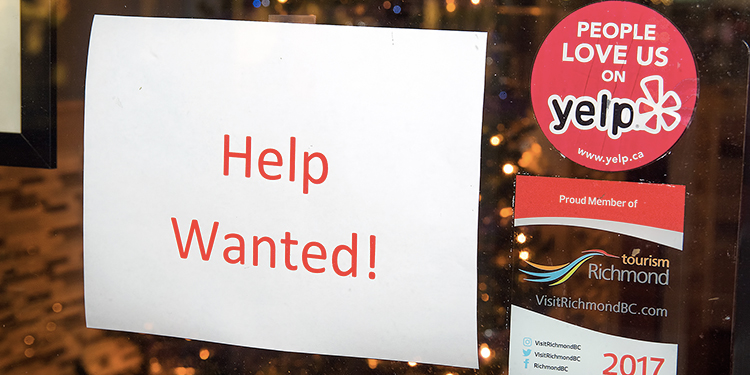Latest News
When good help is hard to find
Published 10:46 PST, Thu December 14, 2017
Last Updated: 2:12 PDT, Wed May 12, 2021
The good news is the unemployment rate is
low. The bad news is workers are hard to find.
According to Shane Dagan, owner and manager
of the Steveston Seafood House, “With young people, we don’t really have much
of a hard time. I think it’s because we have the high school right over here
and there’s not shortage of teenagers here in Steveston.”
It’s not all rosy though. “When it gets up
past high school, it’s hard. One reason I believe is that the transit is poor
so, we’re not able to pull from Vancouver. I can get a body in here but to have
the type of staff that we’re looking for is a little harder to come by. Highly
skilled is hard to find—chefs are hard to find—quality ones,” Dagan says
Bob Brammer, a partner in Tino’s Pizza at
Broadmoor Shopping Centre, uses classic Canadian networking to find his
employees. “I ask the guys or girls who work here if they know somebody.
Seems every time you do advertise, you get
people we don’t really want.”
In country with a relatively low population,
like Canada, it’s not favouritism that gets a job, it’s trust. No one will
recommend a buddy for a position knowing they can’t do the job because neither
person will be trusted again and word gets around. But, when an employer asks
someone they trust for a suggestion for a new employee, the person recommended
is usually up to the job, whether it’s working at the till, scrubbing a grill
or doing geo-technical surveys. Most sectors in this country rely on word of
mouth to find good employees. In fact, the vast majority of jobs in Canada, be
they professional, administrative or entry-level, are never advertised. How
then to find a job?
Shane Dagan says that for him, “The best
thing to do is to show up in person, looking professional, looking the part. I’d
have them show up at an appropriate time, when we aren’t too busy.” He also
says, in addition to your résumé, including a letter is vital.
“More important is a cover letter so we now
their situation, what their intentions are, I don’t have time to sit down and
talk to everyone, so if they can let me know in two paragraphs or less where
they are; what they are looking for; how many days; how many hours; are they
looking for part-time, full-time?”
Dagan says knowing a second language gives an
applicant an extra chance of getting the job. “We have staff who are bilingual
and can speak Cantonese, French and Spanish fluently.”
“It’s extremely important thought, to have to
have good command of English language. There can be an accent but there has to
be a strong enough knowledge of the English language that they converse in a
professional manner,” cautions Dagan.
“As the son of an immigrant, I appreciate the
struggles that some people have, new to the country, but I also see my mom who
learned English at 14. I didn’t know her back then, but I imagine it would have
been a struggle,” Dagan says with a smile in his voice. His mother today works
in management in a Richmond bank.
How does Brammer find new entry-level
employees?
“A lot of our employees are customers or
local kids. If there’s no connection then I take a résumé but nine times out of
10, they have a connection to the restaurant,” he says, again reinforcing the
importance of a personal reference, of networking, even for an entry-level job.
And what about the prospective employee’s
past employment? Brammer has an interesting take on that, saying, “I would
prefer people to have no experience that way I can get them trained the way I
like it.”
And what kind of work do the new employees do
at Tino’s Pizza? “They basically have to do everything. There is nothing that
they don’t have to do. I do everything. I expect you to be able to do
everything. You name it--making salads, making food, working the till.”
And, while there is no formal probationary
period, Brammer says, “It’s pretty obvious pretty quick who can do it and who
can’t. I want to know they can handle the fast-paced situation in a kitchen. It’s
not yelling like on TV shows but it’s very fast-paced. You’ve got to be on your
toes. We find out pretty quickly.”
Both Brammer and Dagan say that more
important than finding good staff, is keeping them.
“Really for me that’s the most important
thing. Once they’re in the door, retaining the staff is easier than finding,
hiring, and training. There’s a financial cost to hiring new staff,” says
Dagan.
Dagan consciously works to make the Steveston
Seafood House a place people want to keep working.
“We try to have fun, to make it a safe, fun
zone where people can look forward to coming to work, and not view it as work
but view it as fun for them,” he says.
Brammer says it’s through a sense of
community, shared goals, and pride in their work.
“I guess you make them feel a part of the
family. People really take an ownership role in being part of the family. I’m
obviously looking at it from that angle. They feel pride in being part of my
family,” he says pointing out that the other owners, who also work there, each
doing all the tasks too, are his brother and his sister.
And the feeling of family, of community
endures long after the employment.
“Last night we had at least three
ex-employees visit, just stop by, talk, get something to eat.”
Brammer says that feeling of family is mutual
and it shows, “A few nights ago, we were getting hammered and I had an
ex-employee who offered to take a couple of deliveries. He just popped in and
offered. That happens quite regularly.”
That night, they hadn’t staffed for a busy
night. That night, people ordered a lot of pizza for delivery to watch the
hockey game at home. “We got hammered before that Canuck’s game because the
last couple of years they weren’t doing that well. “
Citing the effect a winning Vancouver hockey
team has on the local Richmond economy, Brammer says, “Now we’re well up on
game nights, like it was a couple of years ago.”
And do they stay? Brammer says, “We’ve had a
few for over a dozen years, at least three or four of them but they usually
start their last year high school or first of college and they tend to stay
until they graduate from whatever they’re studying. We had three nurses
studying at Langara. They all quit at the same time because they all graduated
at same time. That was a bit of a pain. They graduated last February.”
Even then, Brammer’s loyalty and theirs to
him remains. “One of the nurses was back a couple of Fridays ago because she
knew that we were a little tight on staff.”
Knowing what nights Tino’s Pizza is extra
busy and wanting to pick up a little extra cash, an ex-employee was in touch
recently, asking Brammer, “What do you think of me working Fridays?”
Both Dagan and Brammer recognize the
financial reality of the situation. “Obviously we don’t pay the best,” says
Brammer but they are a family business and family sticks together. “We have our
Christmas party every year. All our present and ex-employees are invited. We
may not pay for ex-employees but they want to partake.”
Dagan too realizes there has to be more than
pay at stake, with his costs high and the margins low in the food industry.
“I know what it costs to live here because I
pay rent as well. How do we pay adults, especially with families, enough so
that they can afford to live but at the same time keep the rest viable? It’s a
balancing act, more of an art than a science. Because if the ship sinks then
everyone’s out of a job and we can’t have that either.”
Dagan says that, out of a staff of 25, he
looks for someone maybe four times per year. How does he keep so much of his
staff, besides the atmosphere he tries to foster every day for his workers?
“At the end of the night, we’ll get pizza
every couple of months and hang out here.
A lot of the staff end up being friends just through osmosis,” he says.
So, if you are looking for that first job,
look for someone who trusts you, who knows what you can do, who already has a
job, then ask if they know of anyone hiring. Learn about the company.
Write up a two paragraph cover letter letting
the potential employer know what kind of work you are looking for, how many
hours you want to work each week and why.
For the interview, wear clean clothes
appropriate to the job. Don’t even think of chewing gum. Look the employer in
the eye and say you would like to work for them. If they say no, go back in
three months’ time. More jobs are found because people follow up than because
they apply in the first place. Ask their advice; do they know of anyone else in
this field hiring? Who would they suggest you talk to? What would they suggest
you do differently? You won’t take more than five or 10 minutes of their time
but the advice could be invaluable. And, good luck.





























